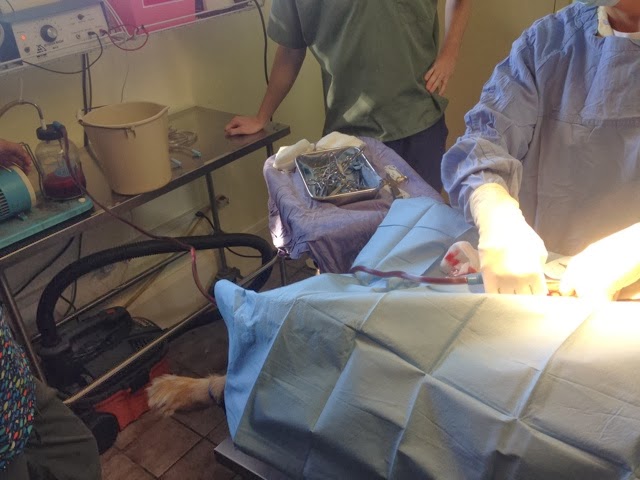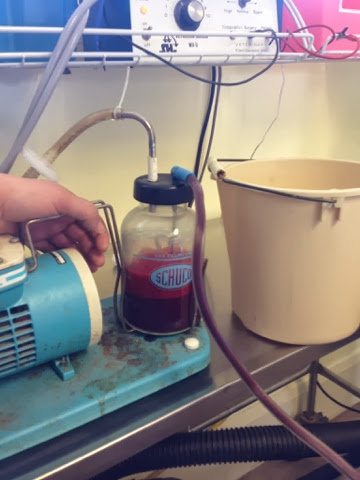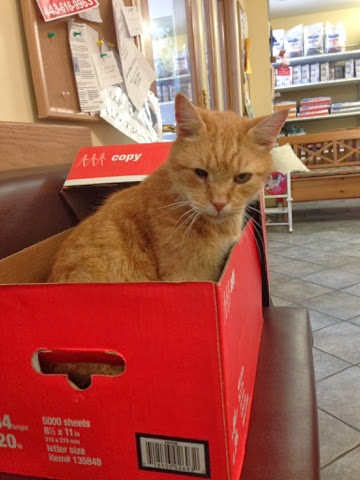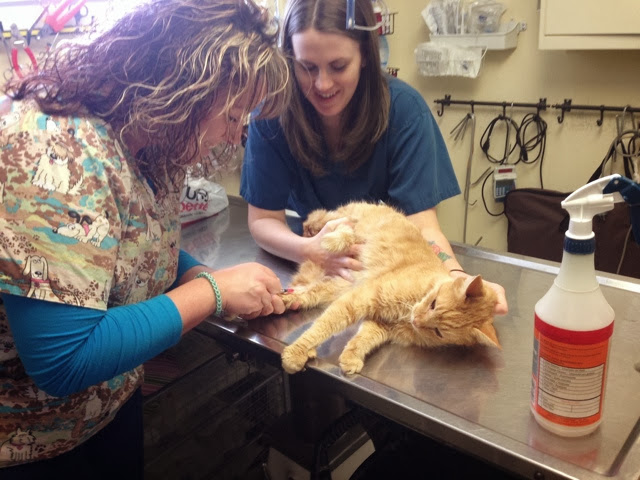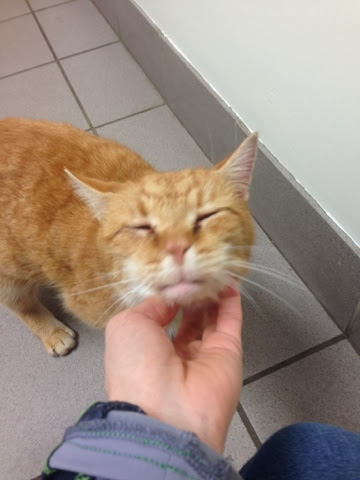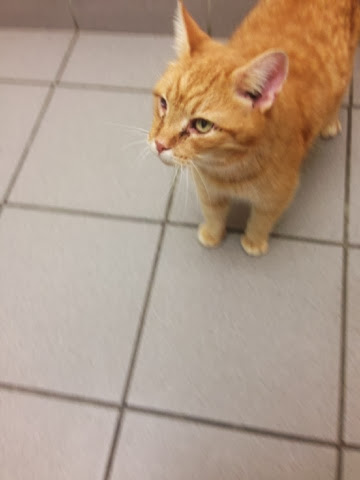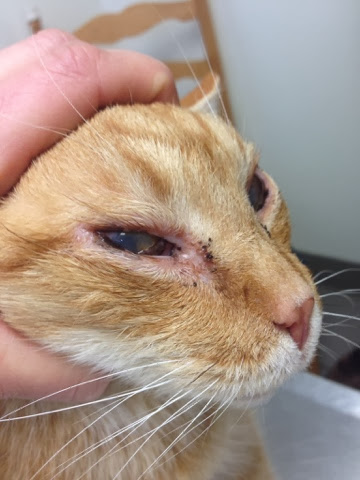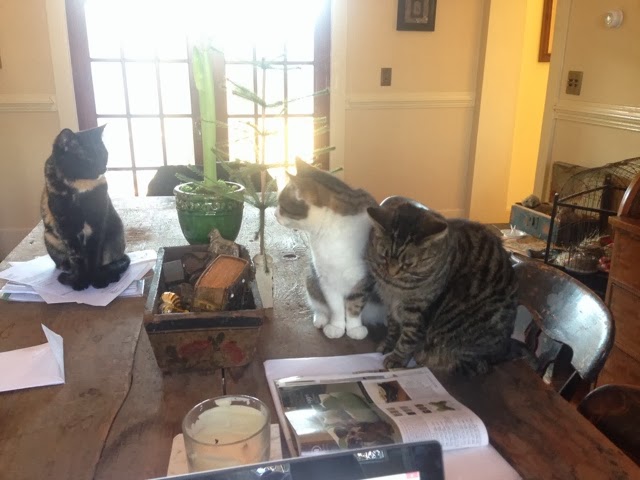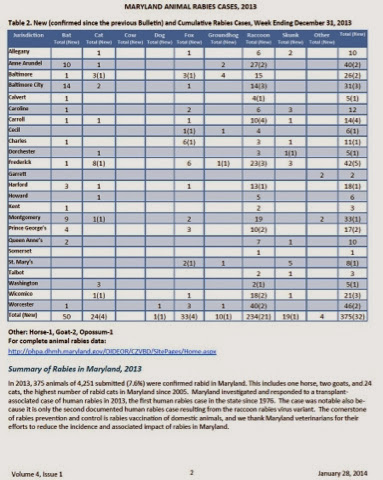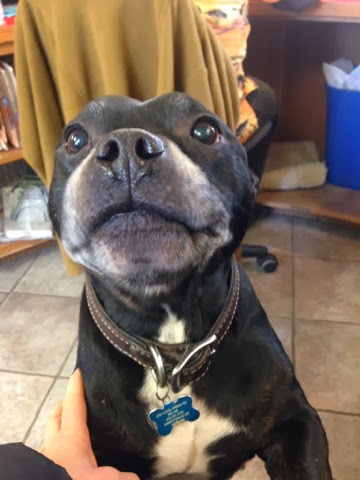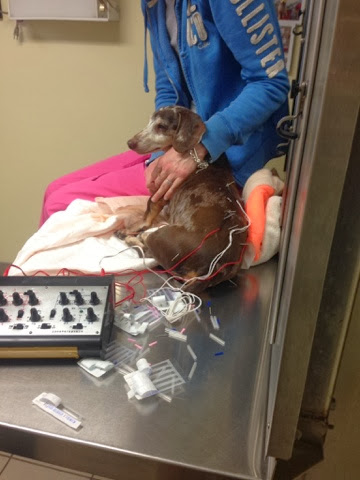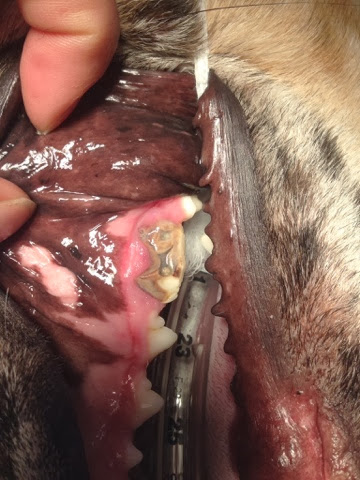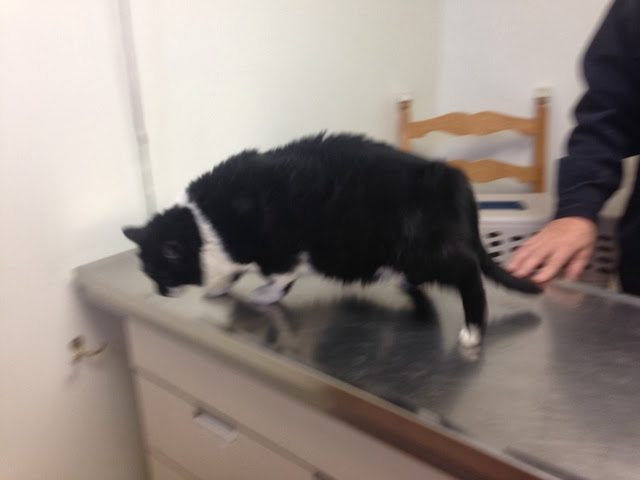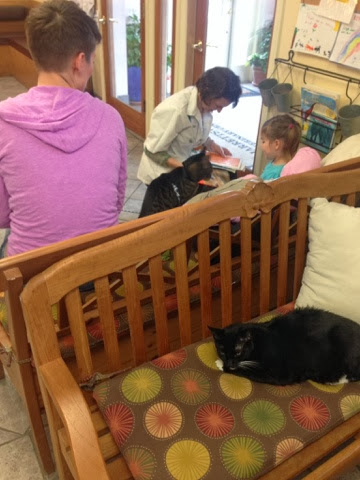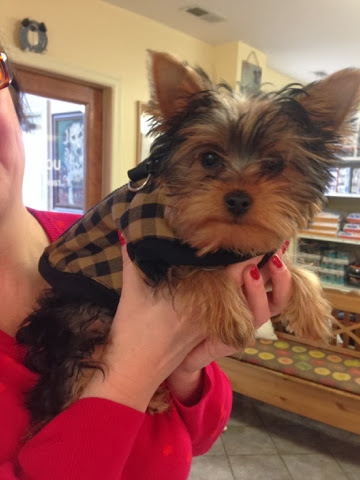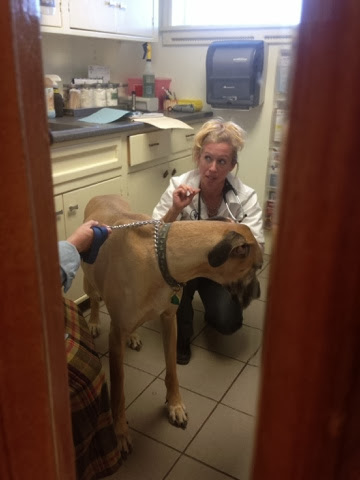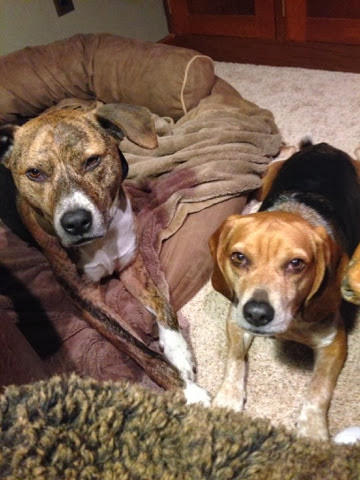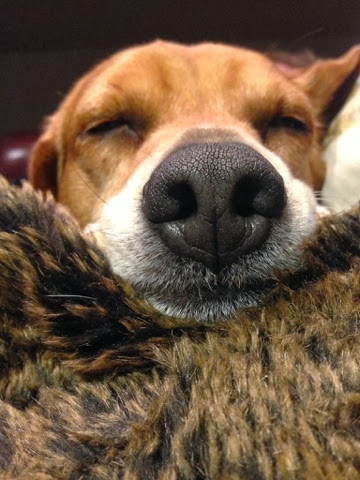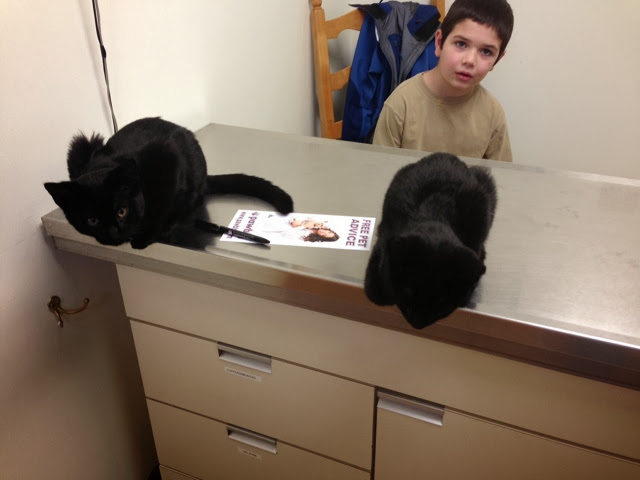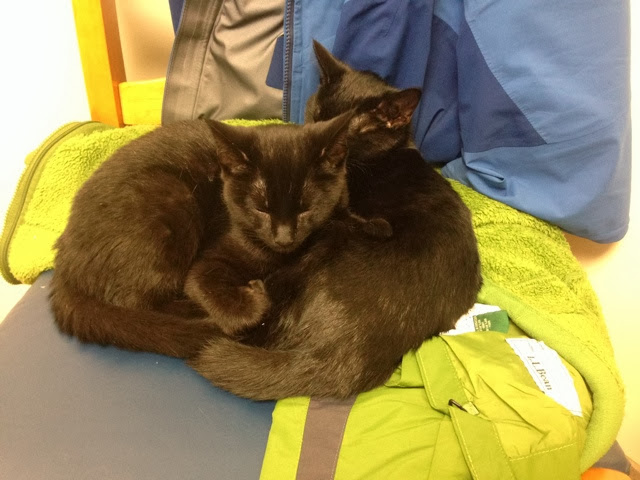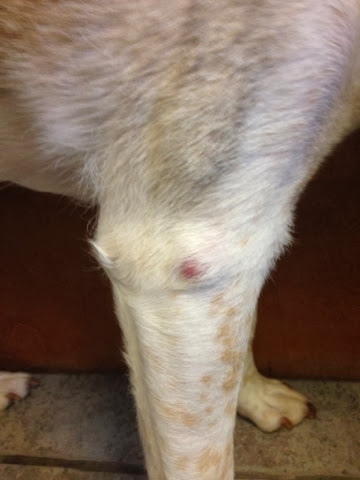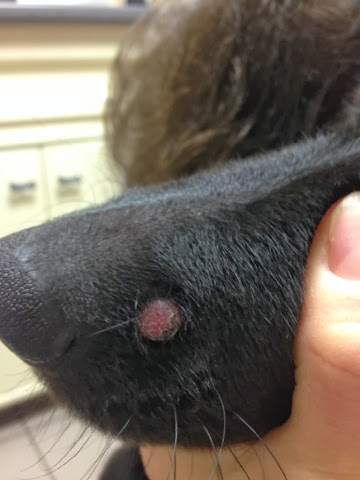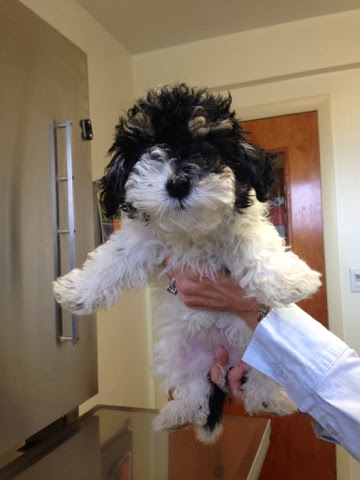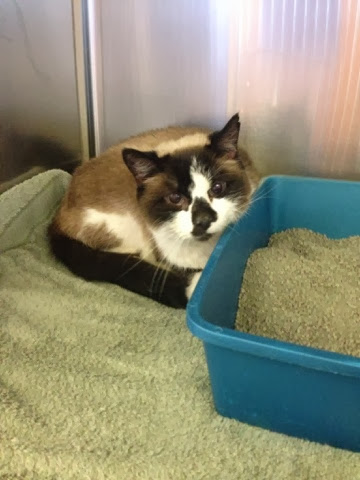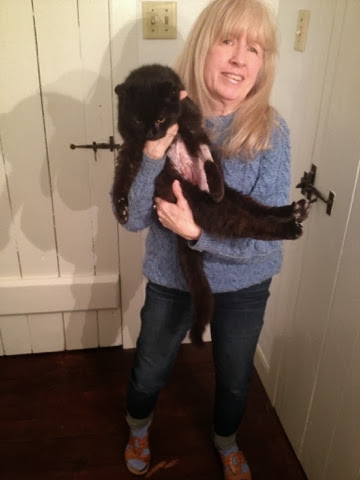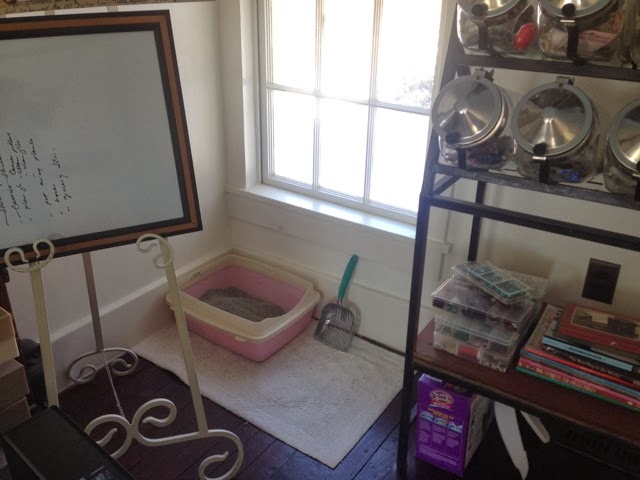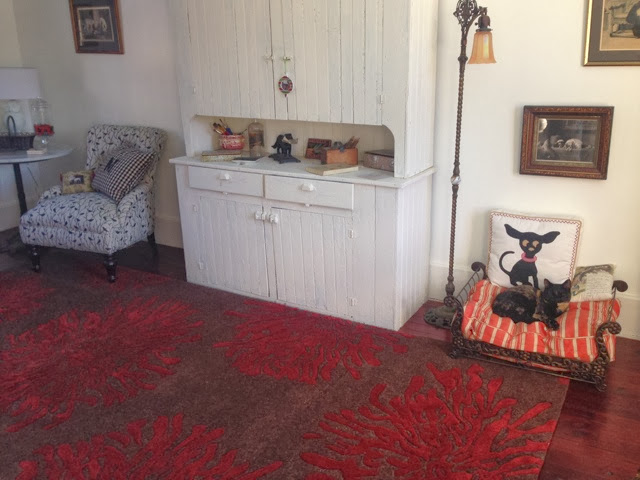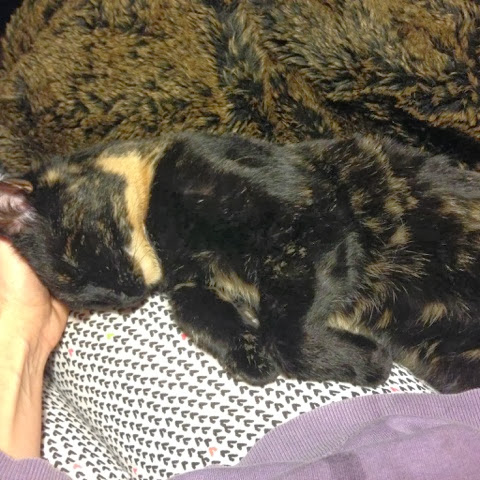 |
| Greta. Sunday January 26, 2014 |
 |
| Can you see a pendulous abdomen? |
Greta was accompanied by her mom Patty. I have known her for many years. She is one of the women who started All Shepherd Rescue. Patty is a stoic woman with a strong determined personality. She is dedicated to helping shepherd's find homes when the public fails them. As a popular breed they need strong, staunch support because many people under estimate their need for work, attention, mental stimuli and a good dermatologist. They lead the breed category list for behavioral problems, (ALWAYS due to lack of socialization as a puppy OR boredom) and dermatological disorders. Don't get a German Shepherd unless you are well informed as to the complex needs of the breed. Please?. Greta came to them as they all do; on death row as an old dog with multiple needs. She had been in the rescue for about two years.
Greta arrived on Sunday a few minutes before closing. After all, she looked and was acting normal to the average on looker. When I met Greta in the exam room her mom said rather matter-of-factly that Greta was here simply because she was drinking more. She just attributed it to old age, and the awful weather. In veterinary medicine we call this polydipsia. Polydipsia can be caused by a multitude of factors. A few are easily treated, and a few are serious and can be life threatening. Never ignore pet that you think is drinking excessively.
AND NEVER EVER WITH HOLD WATER!
Some pets come to me with the other end of this problem, called polyuria. Polyuria is excessive urine output. Some pets demonstrate this by urinating outside of the box, or peeing in the house after being housebroken for years, but in (almost) all cases the polydipsia is causing the polyuria. And,
BOTH REQUIRE QUICK VETERINARY ATTENTION.
As I examined Greta her mom asked me, "Well, what do you think it could be?" Still sounding as if perhaps she might be over reacting to bringing her in on a Sunday.
I looked at her and said, "Well, she has a pendulous abdomen, an excessive heart and respiratory rate, muffled heart and lung sounds and I am very worried about her. She needs an x-ray, full blood work, and probably an ultrasound before I recommend exploratory surgery."
 |
| Greta is a fit and trim girl, BUT, she has lost her normal taper at her waist. This can and does happen quickly IF there is something leaking inside that belly. |
Her mouth opened a bit, she stayed very still, as if waiting for a punchline and then hesitantly asked me "if I thought it was serious?" She was clearly not expecting any of this.
We took x-rays and blood for a complete CBC and chemistry as well as a urine sample. Based on her normal temperature, attitude, and mucous membrane color we decided to have her return first thing in the morning for her ultrasound.
Her x-rays were as I expected, pendulous fluid filled belly with undefined organ definition. Of greatest concern was the inability to see her spleen. I sent a text to Dr. Morgan to beg her to come in on Monday (her very deserved day off) to do an ultrasound for Greta.
On Monday morning Greta returned. But she was a shadow of the girl she had been a few hours ago. She was no longer eating, or happy. She was lethargic, quiet, reluctant and pale. Her blood work from the day before was normal..very normal. The blood was not giving us a clue that she was as sick and critical as she was. Her ultrasound showed an enlarged spleen with nodules and an abnormal liver.
I sat down with Patty to talk about where to go from here. It was not an easy conversation.
She had some very valid concerns, a whole belly of unknowns, and other mouths to save and feed. I get it.
I had a whole host of concerns to. Add to that a dying dog who is a sweet gentle girl, the emotional gravity of the situation, and two strong minded animal advocates, and the boiling pot can explode.
Her concerns were;
- Greta is 8 years old. That is about the normal life span for a German Shepherd.
- She has multiple lesions on her ultrasound.
- To treat her she needs an expensive surgery. At our clinic it is about $1,000. And she runs a rescue.
- The average lifespan IF the surgery is successful is about 6 months.
- Greta will have a recovery period after surgery. She was very concerned about putting her through surgery.
My concerns, and replies to her concerns, were;
- Age is not a disease. I know people use it as a reason to decline treatment but I just don't agree with giving up on treating a pet because of age. We decline more pets lifesaving and beneficial quality of life treatments because we use age as an excuse not to do so.
- Multiple lesions can be evidence of the spread of disease, but they can also be found because we were looking. For example, I took my old dog Ambrose in for an ultrasound and we found three distinct lesions in his abdomen. They included a nodule on his kidney, spleen and in the omentum. I was getting the ultrasound in preparation for chemotherapy to treat the cancer he had on his elbow. Can you imagine how bleak I felt his prognosis was when I realized he had four problems instead of just one? What did I do? I had an exploratory surgery done. Turns out that ALL three abdominal lesions were unrelated benign things. They had nothing to do with his cancer. He went on to have his radiation and did remarkably well for another 6 months. How many other people would have looked past three lesions?
- I cannot argue that resources are scarce for many of us. BUT, what I did argue was that we were at the place where we were deciding to put her down with presumptions. We were about to end her life based on educated guesses. I am not ever content with this. Further, putting her on the surgery table and exploring her abdomen would give us a definitive answer. AND, if it was worst case scenario, where she had metastatic cancer throughout her belly we would know for sure, and we would humanely euthanize her on the table. The cost of this would be about $100.
- I cannot argue with the sands of time. I can only promise to try to offer the best options to return a happy pet to a place where pain is minimized and quality of life is paramount.
- Surgery has inherent risks, and dogs need to be kept quiet and monitored post-operatively. BUT, many pets do very well post-operatively, and there are many good pain medications available, just like in people, to help with this.
At the end of our discussion Patty agreed to give Greta another chance.
Within few minutes Dr. Morgan had Greta on the operating table. Greta's abdomen had 350 mls of blood in it. We removed this and when we did we saw that her liver was engulfed in tumors of all sizes. Her spleen looked similar and her cancer was too advanced to treat.
 |
| Removing the free abdominal fluid. Hemoabdomen. |
 |
| A very abnormal spleen |
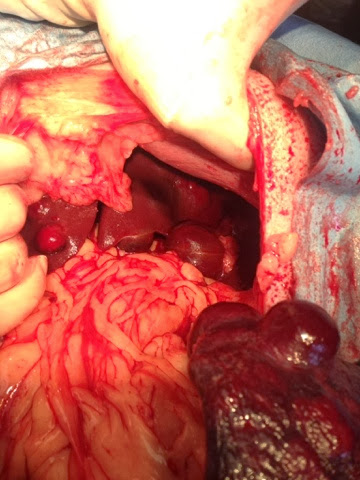 |
| A peak in the abdomen. The liver is full of round tumors. |
Patty said goodbye to her and we stopped her surgery.
Now I understand that many of you will read this and be angered that we put Greta on the table. I want to add that at no point was Greta stressed, or uncomfortable. Putting her to sleep under anesthesia is not any worse (or better) than while she is sitting in front of us. She was not consciously put through anything that was painful or unnecessary. It was done in an effort to save her life. When I spoke to Patty afterward I asked her if she was OK with everything.
She sent me this;
Greta came to All Shepherd Rescue in March 2013 at the estimated age of 7. Her previous owner had had a stroke and could no longer walk or care for the dog. Greta weighed an unhealthy 114 pounds, her coat was matted, and her skin was very dry with some open cysts draining.
Greta was placed on prescription diet food and allowed unlimited exercise in the large yard. She thrived chasing squirrels and chipmunks and playing with the resident dog.
By mid-summer, Greta was a svelte 95 pounds with healthy skin and a glossy coat.
Greta did not appear ill during the months it took her cancers to develop. She was at the vet for treatment and observation in December, 2013 after she ate a loaf of raisin bread. All blood tests were normal and Greta returned home to continue counter surfing.
As January progressed, I noticed Greta seemed to be eating less. She was moving more slowly but I attributed that to the cold weather and possible arthritis. Greta had always enjoyed her water and I was filling the water bucket more often. Saturday night 1/26 Greta drank a gallon of water and refused her dinner and breakfast. We went to the vet that afternoon and sadly she was euthanized the following day.
I have adopted Greta. Every dog at All Shepherd Rescue gets a home eventually.
Patty Visser
If you have a pet related question you can ask it, meet other pet lovers, and help a pet in need next door, or across the globe. You can also find me answering questions for FREE, at Pawbly.com.
Or find me on Twitter @FreePetAdvice.


